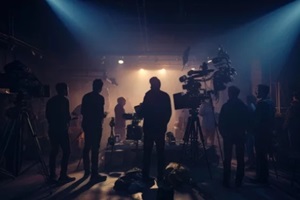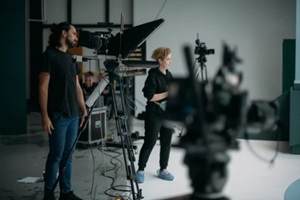 Producers and production managers overseeing extended film projects may require specialized insurance planning for different production phases. When films extend beyond the original timeframe, or if a project is slated to be lengthy right from the start, insurance for feature film production will need to adapt to maintain coverage.
Producers and production managers overseeing extended film projects may require specialized insurance planning for different production phases. When films extend beyond the original timeframe, or if a project is slated to be lengthy right from the start, insurance for feature film production will need to adapt to maintain coverage.
Producers and production managers facing the complex insurance landscape for feature film production must focus on strategic planning and risk management for extended projects.
Working with an insurance agency specializing in the film industry is helpful, as they will know best how to adjust existing or new insurance offerings to suit longer projects.
Here’s what you need to know.
Introduction to Film Production Insurance
Film production insurance is an overarching term covering many types of protection. From damage to equipment to loss of footage and liability concerns, this type of coverage is essential for any film project.
However, an introductory film production insurance policy may only be suitable for short-term projects; most production insurance lasts a year at most.
When annual insurance lapses, films are vulnerable to risks in the interim, and it can be costly and cumbersome to renew a policy each year on the same day it expires. Additionally, film studios relying on the renewal strategy are vulnerable to unpredictable outcomes.
What if an insurance agency changes the insurance terms due to film factors—such as your second year of filming being filled with more dangerous stunts than the previous year? Studios must strategically approach insurance with a lengthy project in mind to achieve the best coverage.
Assessing Your Project’s Insurance Needs
Studios must consider multiple factors to determine how much (and what type of) coverage is ideal for a project. Some of the most important include:
 Location
Location- Duration
- Number of cast and crew
- Reputation of talent
- Rented or owned equipment
- Potential for equipment transport
- Set risk
- Stunt risk
These are a few examples that may change and adapt based on the type of film being produced. A comprehensive risk assessment during the planning phase, guided by an experienced film insurance agency, helps studios tailor insurance coverage specifically to the project’s requirements.
Navigating Insurance During Lengthy Production
The crux of the issue with a long production is ensuring uninterrupted insurance coverage for the entire duration. This can be especially problematic for studios who are unsure how long the final project will take.
When production extends years into the future, it becomes more difficult to predict risk. There is no way to know the weather on a set location two years from now or whether a health issue may affect an essential cast member during this long window.
The best way to secure long productions against risk is to partner with a film-centric insurance agency to start right from the beginning with a multi-year production insurance policy. More specialized insurance agencies may offer this option instead of annual coverage.
Alternatively—and significantly if a shorter production unexpectedly grew much longer—an insurance agency may be able to offer an endorsement added onto an existing policy to extend its influence.
For instance, if an important partner such as a distributor joined the project after the initial insurance was already bought and made extenuating demands, studios may be able to add endorsements such as Rights Period or Term of Contract to alter the scope and duration of their coverage.
They may also be able to secure completion bonds, weather insurance, and other specialized protections, which help mitigate risks in extensive film projects.
Types of Coverage Essential for Long-Term Projects
Insurance coverage varies greatly from one production to the next. In general, a few types of insurance will be necessary no matter what. These include:
 General liability – General liability insurance covers a production studio against legal and financial consequences if a third party should be injured due to filming or if the film causes damage to someone else’s property.
General liability – General liability insurance covers a production studio against legal and financial consequences if a third party should be injured due to filming or if the film causes damage to someone else’s property.- Equipment – If film equipment is damaged or needs to be replaced during filming, equipment insurance can cover the cost and keep the production on schedule.
- Workers’ compensation – Workers who are injured on the job can benefit from workers’ compensation insurance, which may pay for medical treatments, rehabilitation, and time off from work.
- Cast & crew – If a cast member becomes injured or falls ill, cast & crew insurance can help cover the costs of extending filming until they are well or even replacing them if necessary. It may also help with their medical bills.
Protect Your Lengthy Film Project with Comprehensive Insurance Coverage
Film production is often unpredictable, but extending a project across multiple years does not have to result in insurance complications.
Engage with MFE Insurance Brokerage to easily navigate the complexities of film production insurance, ensuring your lengthy project is protected at every stage with tailored, comprehensive coverage. Contact MFE Insurance to explore your options.
